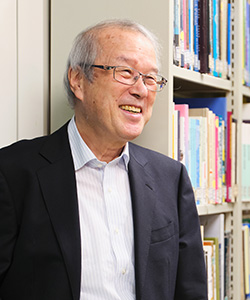Research Division
RESEARCH GROUP Ⅰ
Contemporary Issues on Asia-Japan Economic Relations
This group focuses on Japan’s ties with Asia and policy issues accompanying changes in the economic environment such as globalization. The group conducts academic research on the mechanisms and economic impacts of these changes, while also collaborating with domestic and international researchers to conduct policy research that contributes to the mutual development of Asia. The main research topics of this group include: the international flow of people (immigration, international labor migration, tourism, etc.), international trade and FDI between Asia and Japan, and their relations of interdependence.
| Group Leader | HONMA Masayoshi |
|---|---|
| Member | KO Yi-Chun |
| NGUYEN Phung Thu Hang |
Research Projects for FY2025

A study on the relationship between economic development and agricultural policies in Japan, Korea, and Taiwan
Staff:HONMA Masayoshi
Distinguished Professor
Japan, South Korea, and Taiwan are the regions that have achieved remarkable economic growth since the end of the war. The driving force has been the exports to the world and their transformation of domestic industrial structures based on comparative advantage. In the process, agriculture lost its comparative advantage, and each region saw an increase in imports and a decline in food self-sufficiency. However, in the early stages of economic development, agriculture, although exploited, provided labor and capital to the industrial sector, forming the foundation for industrialization. However, as economic development progressed, agriculture transformed into a protected industry. This study investigates the relationship between economic development and agricultural policies, explores the essence of these changes, questions the merits and demerits of the current state of agriculture in these regions, and considers how it should develop in the future.

The light and shadow of renewable energy expansion: health risk reduction effects and inequality
Staff:KO Yi-Chun
Assistant Professor
Extreme temperatures caused by climate change are leading to adverse health effects. While household temperature control devices such as air conditioners help mitigate health risks, rising energy prices limit their use among low-income households. This study examines how the installation of residential solar photovoltaic (PV) systems reduces health risks and whether these benefits are unequally distributed across income groups and regions. Specifically, using regional-level panel data on mortality rates in Japan, this study measures the impact of residential solar PV installation on health risk reduction and its disparities. By evaluating both the benefits and inequalities of renewable energy use, this study provides evidence for the development of balanced policies that address climate change adaptation and social equity.

Understanding the link between energy poverty and children’s well-being in developing contexts
Staff:NGUYEN Phung Thu Hang
Assistant Professor
This study examines how energy poverty affects children’s subjective well-being in developing countries, filling an important research gap. Energy poverty, which impacts 770 million people without electricity and 2.6 billion lacking clean cooking fuels, undermines health, education, and economic productivity, with particularly severe consequences for children. Utilizing data from the Young Lives project, the study applies a multidimensional energy poverty index and life satisfaction scores to assess well-being. Causal relationships are explored through a two-stage least squares (2SLS) regression using electricity prices as an instrumental variable. The findings aim to guide policymakers in creating targeted strategies to reduce the harmful effects of energy poverty on vulnerable children.
